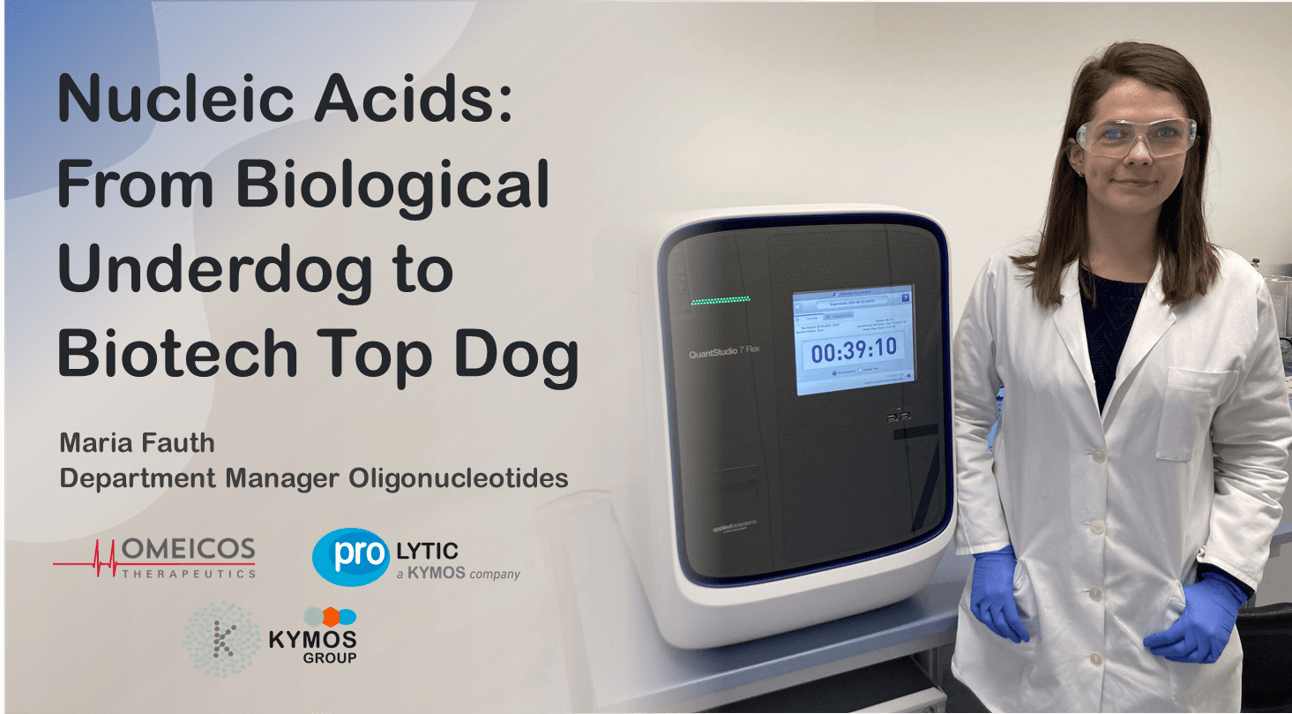
The bioanalysis of nucleic acids, especially in biological matrices, is one of the newest services offered by the Kymos Group and carried out at its German subsidiary Prolytic. Maria Fauth, Head of the Oligonucleotides Department, has dedicated her entire academic and corporate career to the research and analysis of nucleic acids. She and Dr. Janine Lossie from OMEICOS Therapeutics share their perspectives on this promising field:
“Already as a student I was fascinated by oligonucleotides, especially miRNAs.” Maria Fauth begins. “For a long time, the scientific community regarded them as biologically useless molecules, until it was discovered that they have crucial regulatory functions. The significance of nucleic acids has been rising in the healthcare industry ever since, and with the start of the COVID-19 outbreak, mRNA vaccines have been brought to the very forefront of public awareness.”
“This represents a great acknowledgement of our team, who has been studying and working with RNA for decades, but at the same time it represents a great challenge:” Ms Fauth states. “The success of mRNA vaccines has brought a lot of attention but also made it evident that nucleotide drug research can only be performed with robust analytics. This is why we have focused our efforts on the development and validation of standardized and reproducible methods for the quantification of a large variety of nucleic acids.”
The analysis of nucleic acid-based biomarkers or therapeutic drugs calls for distinct bioanalytical approaches owing to their different concentration levels: For the quantification of therapeutic oligonucleotides, ELISA or LC-MS/MS methods are best suited depending on the need for sensitivity. However, these technologies are insufficient for biomarkers at attomolar concentrations where real-time qPCR technology becomes the gold standard. Maria Fauth elaborates further:
“We are very pleased to be able to offer all these methods – hybridization ELISA, LC-MS/MS and qPCR – under GLP conditions at Prolytic. With these technologies, we are not only able to quantify biomarkers or therapeutics based on DNA and mRNA, but also other emerging therapeutic tools such as aptamers or antagomiRs, which are employed to modify gene expression and to affect disease progression. Thus, we cover a broad spectrum of oligonucleotide analysis which our customers appreciate very much” she explains with satisfaction.
As a matter of fact, many global pharmaceutical players and small biotech innovators are increasingly interested in the research of nucleic acids. Dr. Janine Lossie, Head of in-vivo Pharmacology at OMEICOS Therapeutics and a long-standing Prolytic customer, also sees the great benefit of validated analytical methods for nucleic acids:
“Prolytic has accompanied us through the entire development process of our first-in-class small molecule OMT-28. We were very pleased to learn that Prolytic can also measure nucleic acids under GLP, as we see the potential to use these as biomarkers for evaluating the efficacy of our drugs in the future. We are confident in Maria Fauth’s team proficiency and are positive that our cooperation in this area will continue to grow.”
The determination of nucleic acid biomarkers under GLP is currently recommended but not a mandatory requirement. Nonetheless, Maria Fauth has the firm conviction that with both the FDA and EMA paying increasing attention to nucleic acid-based biomarkers, it is only a matter of time corresponding guidelines will be introduced. Her team has prepared accordingly:
“As we are experiencing growing demand, we have established an automated processing system for nucleic acids based on magnetic beats and installed a multiplex qPCR instrument” Ms Fauth states. “As a result, we are now able to achieve much higher throughputs and prepared to meet the future needs of our customers.” After this Maria Fauth ends with the following thoughts. “It is a personal delight that the scientific discipline to which I have devoted years of my career, is now going through such spectacular development. Me and my team very much appreciate the innovative spirit at Prolytic and Kymos and are very much looking forward to all those interesting projects to come.”
OMEICOS Therapeutics is a biopharmaceutical company developing first-in-class small molecule therapeutics for the prevention and treatment of cardiovascular and other diseases, associated with inflammation and mitochondrial dysfunction. Find more information on www.omeicos.com or contact on info@omeicos.com.

